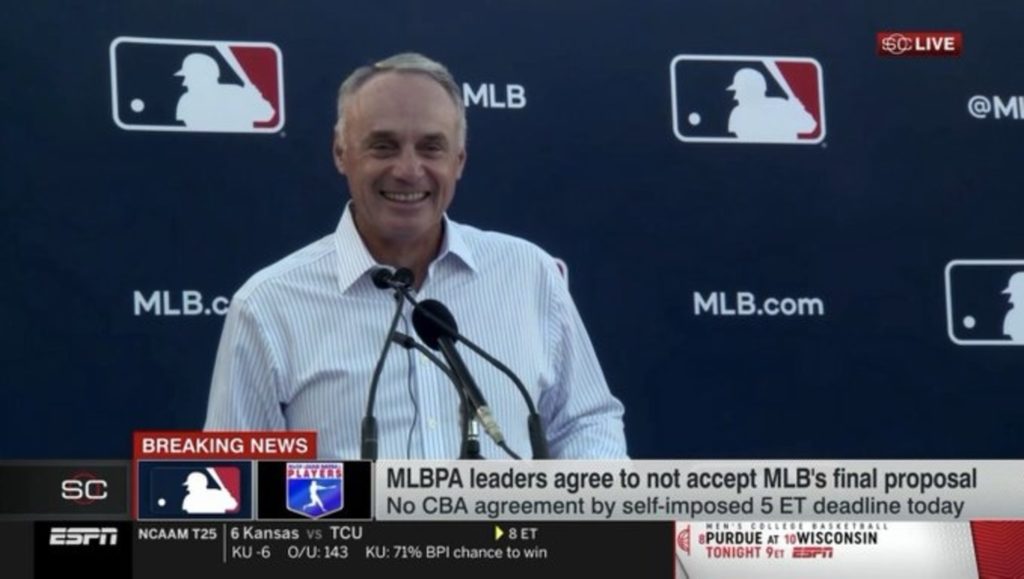MLB Owners realize their ultimate goal of not playing baseball games

With the momentum allegedly coming out of last night’s sessions in fact just an illusion designed to make people forget that owners are 100% responsible for the lockout and are refusing to negotiate in good faith, the owners got their wish by cancelling the first week of games with considerably more likely to come:
No one should be surprised it’s come to this. For nine months, the Major League Baseball Players Association has tried and tried to make a deal. It could have attempted to shoot the moon, looking to make up for 20 years of playing defense while watching its share of the revenue shrink. But despite MLB commissioner Rob Manfred’s characterization of the union’s initial offer as “collectively the most extreme set of proposals in their history,” MLBPA was not as bellicose as it could have been. Rather than trying to abolish the competitive balance tax or revenue sharing, or to take years off the path to free agency—suggestions that would have made the negotiations even more ponderous and acrimonious than they have been already—they sought to tweak the current system: to rebalance the sport’s incentive structure, so teams would be emboldened to invest in the on-field product.
Even that was too much for ownership. After years of bitter back-and-forth and weeks spent at the negotiating table, the owners have barely moved. For a time, it seemed like the deadline was inspiring real progress: The league finally backed off its most punitive proposed competitive balance tax penalties, for example, and both parties are now only $25,000 apart on a new base minimum salary. But when the dust settled Tuesday, that hope turned out to be a mirage.
The owners’ proposals indicate a desire to effectively freeze overall spending—reduce it, in fact, relative to inflation. In addition, they seek MLBPA’s approval to open lucrative new revenue streams, like advertising on uniforms and an expanded postseason. And if anyone doubted their willingness to shut down the sport in order to impose a diktat on the MLBPA, that optimism faded on Tuesday afternoon.
[…]
Unfortunately, the ship might have already sailed on a fair deal. There’s nothing the union can agree to now that would represent anything short of a titanic windfall for ownership. Far from clawing back what’s been lost since the last strike in 1994-95, the best the MLBPA can do is slow—not stop—the bleeding.
MLB’s revenues continue to explode. The league took in $10.7 billion in the last pre-pandemic season. Financial details for most clubs are a closely guarded secret. But the Braves, who are owned by the publicly traded Liberty Media Corporation and therefore must publish financial statements, reported a profit of more than $100 million in 2021.
MLB also stands athwart new frontiers in real estate development, gambling, and technology. These side investments could make the sport itself a vestigial part of the balance sheet. The players aren’t asking for a stake in those ventures; they’re merely imploring the people who own the teams to try to compete. And they’ve been told those terms are unacceptable.
In five years of operation under the last CBA, the players expected ownership would abide by the norms that had governed the game since its professionalization. They were proved wrong. Then the players tried to negotiate. They were rebuffed. They tried to appeal to the good of the industry, to sway public opinion. Ownership was unmoved, its collective heart—such as it is—only hardened by the players’ impertinence.
The truly sick joke behind this unvarnished greed is the owners claiming to care about “competitive balance.” This couldn’t be further from the truth. What the owners care about above all is making sure that “having a bunch of Quad-A hitters with 14 HR and 230 L and a bunch of AA pitchers with Boeing ERAs play in front of 3,000 fans while claiming their deliberate non-competitiveness is actually a galaxy-brained TANKING scheme” remains a profitable business model.
LGM can express some rare sympathy for Derek Jeter, who was under the severely mistaken impression that the Marlins wanted to compete rather than lose 95 games a year in front of now fans while shoving the competitive balance revenues (and now 12-team playoff revenues) into their already bloated pockets:
To wit: While the league and the MLBPA negotiated in Jupiter, Florida, on Monday, the Miami Marlins and CEO Derek Jeter parted ways. Reportedly at issue: some $10 million to $15 million that Jeter had been promised to build a competitive team around his collection of exciting young pitchers. Last year, the Marlins were outspent more than 2-to-1 by the Braves, about 3-to-1 by the Phillies, and almost 4-to-1 by the Mets. Jeter, as much of a baseball man as ever there was, seems to have operated under the mistaken impression that the disparity in investment was a temporary setback, rather than the business model itself.
Our plutocrat class gets more reprehensible by the day.
Team owners are, collectively, people who think the state should pay for their ballpark but not your heart medication. Stop defending them.— Joe Sheehan (@joe_sheehan) September 20, 2017


